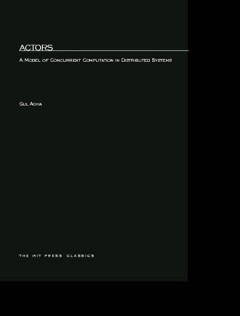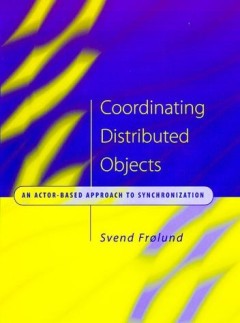Filter by

Actors :a model of concurrent computation in distributed systems
The transition from sequential to parallel computation is an area of critical concern in today's computer technology, particularly in architecture, programming languages, systems, and artificial intelligence. This book addresses central issues in concurrency, and by producing both a syntactic definition and a denotational model of Hewitt's actor paradigm--a model of computation specifically aim…
- Edition
- -
- ISBN/ISSN
- 9780262255554
- Collation
- 1 online resource (ix, 144 pages) :illustrations.
- Series Title
- -
- Call Number
- -

Coordinating Distributed Objects: An Actor-Based Approach to Synchronization
Coordinating Distributed Objects presents a novel object-oriented methodology to simplify the construction of distributed software systems. The methodology is based on a programming construct, called synchronizer, that allows the coordination of distributed application components to be programmed in a modular fashion and at a high level of abstraction. The methodology offers new insight into th…
- Edition
- -
- ISBN/ISSN
- 9780262273299
- Collation
- 1 online resource (xxii, 195 pages) :illustrations
- Series Title
- -
- Call Number
- -

https://doi.org/10.7551/mitpress/11022.001.0001?locatt=mode:legacy;http://www…
A guide to understanding the inner workings and outer limits of technology and why we should never assume that computers always get it right."In Artificial Unintelligence, Meredith Broussard argues that our collective enthusiasm for applying computer technology to every aspect of life has resulted in a tremendous amount of poorly designed systems. We are so eager to do everything digitally--hir…
- Edition
- -
- ISBN/ISSN
- 9780262346733
- Collation
- 1 online resource (237 pages) :illustrations.
- Series Title
- -
- Call Number
- -

Calculating a Natural World: Scientists, Engineers, and Computers During the …
How the complex interplay of academic, commercial, and military interests produced an intense period of scientific discovery and technological innovation in computing during the Cold War.OCLC-licensed vendor bibliographic record.
- Edition
- -
- ISBN/ISSN
- 9780262266895
- Collation
- 1 online resource (ix, 427 pages) :illustrations.
- Series Title
- -
- Call Number
- -

Insolvent :how to reorient computing for just sustainability
"This book proposes a framework for the design of systems that will advance social and environmental justice along with technical and economic objectives"--OCLC-licensed vendor bibliographic record.
- Edition
- -
- ISBN/ISSN
- 9780262374668
- Collation
- 1 online resource
- Series Title
- -
- Call Number
- -

Data is everybody's business :the fundamentals of data monetization
"A guide for business leaders to understand the capabilities and strategies necessary to make money from their data"--OCLC-licensed vendor bibliographic record.
- Edition
- -
- ISBN/ISSN
- 9780262375344
- Collation
- 1 online resource.
- Series Title
- -
- Call Number
- -

Computational thinking
An introduction to computational thinking that traces a genealogy beginning centuries before the digital computer. A few decades into the digital era, scientists discovered that thinking in terms of computation made possible an entirely new way of organizing scientific investigation; eventually, every field had a computational branch: computational physics, computational biology, computational …
- Edition
- -
- ISBN/ISSN
- 9780262353410
- Collation
- 1 online resource (272 pages) :illustrations
- Series Title
- -
- Call Number
- -

The LOCUS distributed system architecture
"Computer systems consisting of many machines will be the norm within a few years. However, making a collection of machines appear as a single, coherent system - in which the location of files, servers, programs, or users is invisible to users who do not wish to know - is a very difficult problem. LOCUS, a distributed version of the popular operating system Unix, provides an excellent solution.…
- Edition
- -
- ISBN/ISSN
- 0262288419
- Collation
- 1 online resource (xv, 148 pages) :illustrations.
- Series Title
- -
- Call Number
- -

Leonardo's laptop :human needs and the new computing technologies
"Ben Shneiderman's book dramatically raises computer users' expectations of what they should get from technology. He opens their eyes to new possibilities and invites them to think freshly about future technology. He challenges developers to build products that better support human needs and that are usable at any bandwidth. Shneiderman proposes Leonardo da Vinci as an inspirational muse for th…
- Edition
- -
- ISBN/ISSN
- 9780262256988
- Collation
- 1 online resource (xi, 269 pages) :illustrations
- Series Title
- -
- Call Number
- -

Protocol :how control exists after decentralization
How Control Exists after DecentralizationIs the Internet a vast arena of unrestricted communication and freely exchanged information or a regulated, highly structured virtual bureaucracy? In Protocol, Alexander Galloway argues that the founding principle of the Net is control, not freedom, and that the controlling power lies in the technical protocols that make network connections (and disconne…
- Edition
- -
- ISBN/ISSN
- 9780262273428
- Collation
- 1 online resource (xxvi, 260 pages) :illustrations.
- Series Title
- -
- Call Number
- -
 Computer Science, Information & General Works
Computer Science, Information & General Works  Philosophy & Psychology
Philosophy & Psychology  Religion
Religion  Social Sciences
Social Sciences  Language
Language  Pure Science
Pure Science  Applied Sciences
Applied Sciences  Art & Recreation
Art & Recreation  Literature
Literature  History & Geography
History & Geography